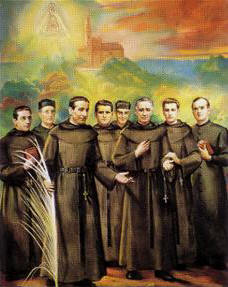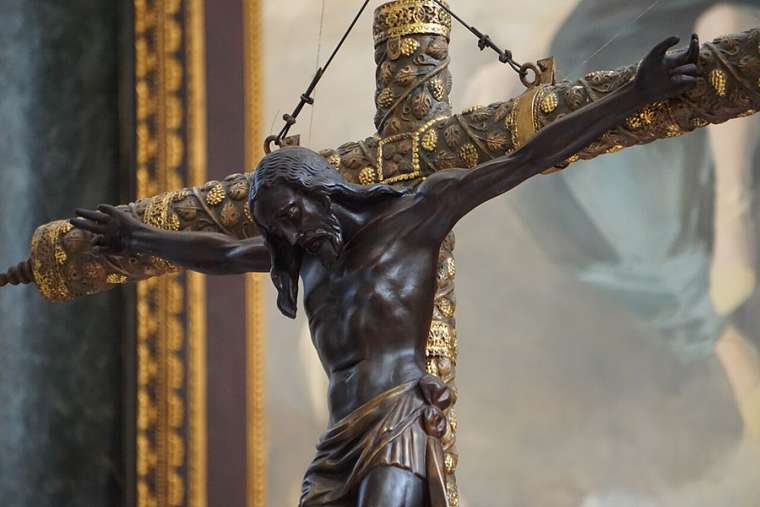Francis Audi Cid, Rovira Orlandis and Llatji Blanch, SJ
Servant of God Francis Audi Cid, SJ
Born : February, 8, 1872
Died : November 3, 1936
Servant of God John Rovira Orlandis, SJ
Born : October 4, 1877
Died : November 3, 1936
Servant of God Joseph Llatji Blanch, SJ
Born : August 17, 1893
Died : September 5, 1936
 Frs Audi, Rovira and Llatji were the three Jesuit Servants of God who were martyred at Tortosa during the Spanish Civil War which broke out in mid-July 1936.
Frs Audi, Rovira and Llatji were the three Jesuit Servants of God who were martyred at Tortosa during the Spanish Civil War which broke out in mid-July 1936.
Fr Audi who was the superior of the Jesuit retreat house in Tortosa at the time of his martyrdom, was born in Roquetas, near Tortosa. He entered the Jesuit novitiate outside Saragossa on Sep 1, 1893 and after finishing his classical studies and philosophy, he taught at St Joseph’s College in Valencia before doing his theology in Tortosa. He was ordained in 1906 and taught psychology in a college at Orihuela after his tertianship. He moved to the retreat house in Tortosa in 1916 and became superior of the community in 1919 until 1924 when he became superior of the retreat house in Huesca. He returned to Tortosa again as superior in 1927.
Fr Rovira was born in Palma in Majorca and entered the novitiate near Saragossa on Nov 25, 1895. He spent two years in Madrid for his graduate studies and then did his theology in Tortosa in 1906. After he was ordained in 1909, he spent three years in Rome studying for an advanced degree in Sacred Scripture and upon completion, he returned to Spain to teach Old Testament at the Jesuit theologate in Sarria.
Frs Audi and Rovira were living in the same community in Tortosa since 1927. When the Society was suppressed in Spain and the community had to disperse in 1932, the two priests remained together but had to separate to seek refuge with friends when civil war broke out in July 1936. Fr Audi went to stay with his brother Thomas in his farmhouse in the early morning of July 31, 1936 and three days later, Fr Rovira joined him. For the next three months they stayed on the farm’s upper floor secluded from the family & with the shutters down.Despite the secluded life, Fr Audi’s spirits were high but Fr Rovira who kept to himself was worried and panicky at times and even thought of going to Majorca had Fr Audi not talk him out of it as he was certain to be captured and killed.
On Nov 3, 1936 some communist soldiers unexpectedly came to the farmhouse to search it as they claimed a radio was illegally hidden inside. Fr Audi immediately made his way into the orchard but Fr Rovira kept to his room and was found by the soldiers who took him downstairs and searched him. They then forced Fr Rovira and Thomas Audi, Fr Audi’s brother, to walk to their headquarters. Fr Rovira who was in his sixties was exhausted from the long walk and had difficulty walking up the stairs into the building. When the department chief saw him, he said angrily: “This is not Fr Audi.”
When the soldiers returned to the farmhouse the next day, Fr Audi was initially not there but when he returned he gave himself up and went with them to their headquarters. The two priests were beaten, brutally kicked and trampled upon and the kicks became more frequent when they refused to blaspheme and deny God. At ten in the evening, they were taken from their cells and led to a quiet roadside where they were martyred. Thomas Audi was released the following day without knowing the fate of the two priests.
Thomas Audi’s son and son-in-law went at dawn the next morning to see what they could find. Half way between Tortosa and Santa Barbara along the road leading to Valencia, they found the bodies of both priests in a ditch. Each had their hands tied behind his back. Fr Audi had several blows to his head and many bruises over his body but it was gunshots that killed him.
Fr Rovira had received worse treatment as his skull was smashed open and his face and body badly bruised. The city officials refused the Audi’s family’s request to have them buried together. They however allowed Fr Audi to be buried in the family plot but Fr Rovira was placed in an unmarked grave.
Bro Joseph Llatje, the third Jesuit to be martyred in Tortosa two months earlier was born also in Roquetas, the same hometown of Fr Audi. He entered the Society at Gandia and was the tailor at the Tortosa scholasticate for six years and when he went to St Dominic in Orihuela, he was in charge of the laundry room. Then, during the time of the suppression, he went to Barcelona. Later, as he was planning to go to Tortosa to visit his ailing father, the civil war broke. However, he did not heed his friends’ entreaties against going and not to wear his religious habit.
 On the evening of July 28, 1936 while traveling on the night train to Barcelona, he was detained for questioning by the communists when it stopped at Tortosa at 4.00 am the following morning. When he told them that he was merely visiting his sick father, they got two guards to accompany him to the house and after they were satisfied that he was speaking the truth, they instructed him: “Don’t leave the house and nothing will happen to you.’ Bro Llatje spent a month with his family and when his sister expressed her fears, he simply responded: “If they kill us, what of it, we will be martyrs.”
On the evening of July 28, 1936 while traveling on the night train to Barcelona, he was detained for questioning by the communists when it stopped at Tortosa at 4.00 am the following morning. When he told them that he was merely visiting his sick father, they got two guards to accompany him to the house and after they were satisfied that he was speaking the truth, they instructed him: “Don’t leave the house and nothing will happen to you.’ Bro Llatje spent a month with his family and when his sister expressed her fears, he simply responded: “If they kill us, what of it, we will be martyrs.”
On Sep 5, Bro Llatje’s freedom came to an end for on that evening after all had gone to bed and he was alone, six armed men came to the house and took him to their headquarters on the pretext of making a declaration. He did not tell his family as he was assured that it would only take a few minutes. His sister-in-law however from her window above saw them handcuff Bro Llatje and shove him into a car. Shortly after, she heard three shots before the car sped off through the town at great speed.
Early the next morning, Mr Llatje instructed another son to walk along the road and see what had happened to Bro Llatje. Within a short walk of less than a mile, he found his brother stretched on the ground, dead from gunshot wounds. The body was taken to the cemetery and buried.
The diocesan investigation into the martyrdoms of Fr Audi, Rovira and Bro Llatje was officially opened in Tortosa on Nov 25, 1950.
